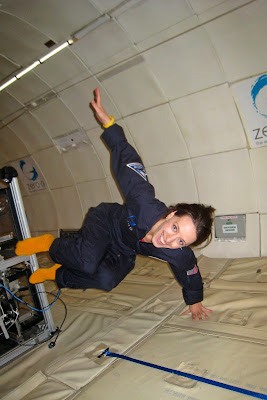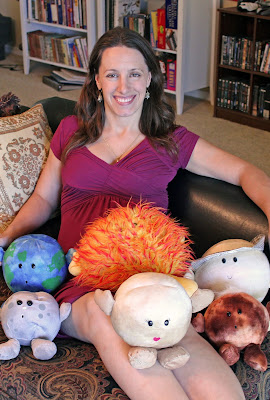One year ago, I quit grad school. In retrospect, it was the right move, and I don’t regret it.
I’ve started and stopped this entry several times. What’s right for me isn’t right for everyone. Quitting grad school just before the final step of writing and submitting my doctoral dissertation was the right move for me. I feel compelled to explain why. Someone reading this might be in a similar circumstance making a similar difficult choice, or know something who is.
I spent 12 years in higher education: 4 years for my bachelor’s degree, 2 years for my master’s degree, 1 year conducting doctoral research on high-energy astrophysics, took a few months off to work at NASA MSFC, 1.5 years of graduate coursework in planetary science, and 3 years conducting doctoral research in experimental planetary science. Somewhere in there, I passed the most difficult physics exam of my life: the doctoral comprehensive exam. I was at the end of my academic journey.
 |
| Graduating with my Bachelor of Science in astronomy/astrophysics |
Why did I stop? Well, why did I start? When I was exploring careers in high school, I knew that I wanted to work in the space program. I loved my math and physics classes and I was captivated by astrophysics, especially cosmology. Everything I read described an astrophysics education ending in a PhD, so that’s what I thought that I needed. I didn’t know of any other way.
It wasn’t until well into graduate school that I began to recognize that my career options were more open than I initially thought. Professorship is the goal of the vast majority of physics doctoral students, and most professors are in the mindset of training their future colleagues and replacements like an apprenticeship. I knew very early on that I was separate from my classmates in that my goal was not a professorship. I didn’t even want a post-doc if I could help it.
Instead, I explored the option of becoming a researcher for a national lab. At first it was thrilling to research astrophysics at NASA! My goal was to work for NASA, and there I was. As the years went on, I realized that I needed to be especially passionate about my tiny sub-subfield in order to dedicate a large part of my life day in and day out to researching it. I enjoyed my research but I hated programming, and my interests were becoming broader. I recognized that I wanted to move on to a position that was more hands-on. I also wanted to get involved in space policy and the commercial space industry.
 |
| Graduating with my Master of Science researching high-energy astrophysics |
I had a professional crisis when I experienced my first workplace bully: my master’s degree advisor. I had already passed my doctoral entrance exam, obtained my master’s degree, and was a year into my doctoral research. She saw our relationship is mentor and apprentice. She had the next several years of my life planned for me, including a post-doc with her colleague at a university in Europe, never mind what I wanted. When I began exploring my career interests, broadening my scope within physics, our relationship became toxic. Finally, she gave me an ultimatum: my way or the highway. It was a very difficult decision, but an important one. I decided not to let anyone limit my career options, but instead to pursue my interests where they would lead me.
My doctoral advisor at my next university was the opposite of my previous advisor: supportive, encouraging of my own path, and even broad in interests himself. I learned more applied physics and engineering skills in the lab, which was a refreshing change. Through him I was introduced to several contacts who have helped me enter the world of NewSpace and space policy. He always encouraged my growth. The more my world opened to the possibilities that lay in front of me, the less important my PhD became. For the first time in my life, I recognized that I didn’t need my PhD to achieve my career goals and become successful. But I still wanted the title.
 |
| Conducting lab work as a doctoral student |
I’ll admit it: I used to look down on people who quit grad school. I used to think that they just couldn’t cut it and that I was superior to them for sticking with it. It didn’t occur to me that they had found a better path for themselves. The experience of quitting has humbled me. I didn’t fail out, I could have continued on and graduated, but I chose not to. My choice doesn’t make me inferior to anyone, just different. I had to get over that pride of losing the title of Doctor before I was able to make a clear decision about my future.
Many well-intentioned people counseled me not to quit. One colleague remarked how much respect he got from his colleagues after obtaining his doctorate. But really, I simply have to say the words “astrophysics” or “planetary science” and people look at me differently. I know that I’m competent in my field and others see that as well. I don’t need a title to gain other people’s respect. I already respect myself.
Another colleague warned me that I was disappointing those who had gotten me this far and that it was unfair of me to quit now. I was most concerned about this. I asked my doctoral advisor on two separate occasions if he is disappointed in me for quitting. He assured me that he isn’t. Me quitting grad school was his suggestion, after all!
Why would my advisor recommend that I quit grad school? He saw that I had already moved past it, but I was too stubborn to let it go. As I was approaching the end of my studies, I began my job search. I was told that it could take over a year to find employment, but I was offered a job within a month! A colleague recommended me to a local company that was looking to hire a space scientist, and there I was. Networking pays off. I had wanted only part-time work while I finished my dissertation, but the offer was for a full-time position, so my dissertation became a hobby to do in my spare time.
 |
| Transitioning to a professional in my day job, right before quitting grad school |
I was surprised when I attended a party with my advisor and fellow grad students a few months after taking the job. I was feeling shame for making very little progress on my dissertation. They were so proud of me for landing a full-time job in my field before even graduating. The girlfriend of a grad student even remarked that she wished that her boyfriend would do the same. Everyone was happy for me.
My surprise continued when I visited the university department nearly a year later. I had expected my former professors to be disappointed in me and perhaps even feel betrayed that I had left them. The opposite was true: they were proud of my success and saw me as a peer. As a student, I had never felt that level of respect from them as I did when I visited them as grad-school drop-out professional.
I’d be neglectful if I didn’t admit that money was a factor. Almost all scientific research is conducted mainly by graduate students who work greater than 40 hours per week, but who are paid peanuts for 20 hours per week. When I took my first professional job, my salary nearly tripled. My current job pays nearly quadruple what I made as a graduate student. I never got into my career for the money, but now that I have a house and a family, money matters.
Grad school became a financial burden after I took my full-time job in industry. Although my salary tripled and I’m a frugal and financially responsible person, my school expenses became too much for me to handle without taking on student loans, something I hadn’t done since undergrad. I managed to avoid student loans by depleting my savings.
After I left my university department’s employment as a graduate research assistant, I was responsible for my tuition payments. I was only enrolled in 3 credits per semester for a doctoral research course, basically, a symbolic class for the privilege of calling myself a doctoral student. Unfortunately, once I left my department’s protection, the university saw me as a dollar sign instead of a person. They used a loophole to unfairly charge me over triple the tuition rate, and even my protest to the university president landed on deaf ears because universities are all about profit (and I attended a public university!).
Had I been charged a fair tuition rate, I would have been able to afford to stay enrolled in grad school indefinitely and may have eventually finished. The greed of the university forced me to make my decision to quit when I did, which may have been a good thing in the long run because I didn’t drag it out too long. To this day, I regret paying that last semester’s tuition, as that money would have served me much better in my savings account.
When my advisor approached me about quitting grad school, I was busy with my day job and my other responsibilities, I was nearly broke from educational and housing expenses, and my dissertation had only progressed slightly in the year since I took a full-time job. After the initial punch in the gut that was my pride saying, “I am not a quitter!” I recognized that he was right. He said that trying to finish my dissertation when my heart wasn’t into it was making me miserable. At that point, I was satisfied with my academic and research work, my career had moved on, and I no longer needed to hang on to my past. When I finally quit, I felt free.
Will I ever go back to school? Maybe, but not now and not in the same field. I’ve played with the idea of getting a second master’s degree in space policy or commercial space, but I’ve been told repeatedly that those degrees aren’t necessary for me. Colleagues have even suggested that I could teach courses in those programs. I don’t need formal education to learn something new. The title of Doctor is no longer important to me, but if I ever change my mind and want to become a professor, I’ll need that credential. What I’d get my doctorate in, I don’t know, but if it’s meant to be, it will become clear. For now, I’m satisfied with my path, moving forward in my own way! I’m ABD and happy with it!
 |
| Posing in front of my office building right outside of NASA Kennedy Space Center |

















